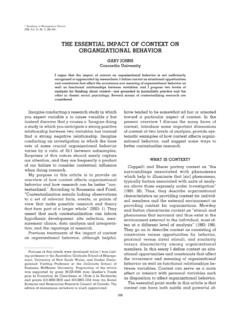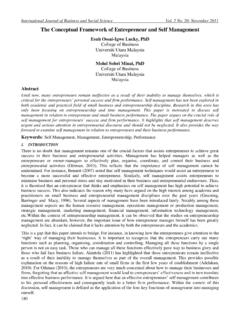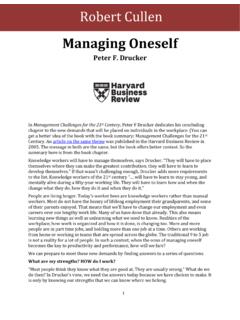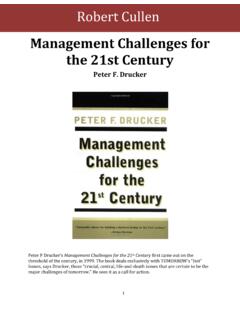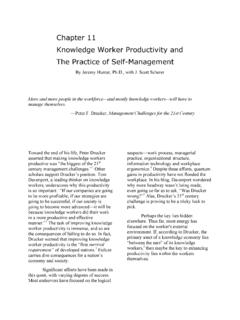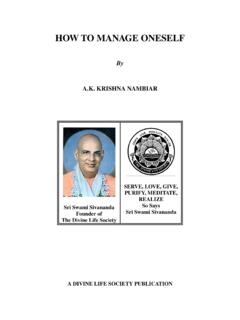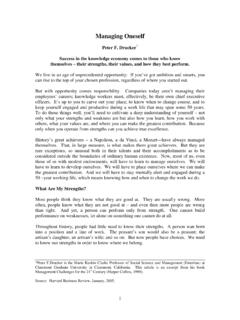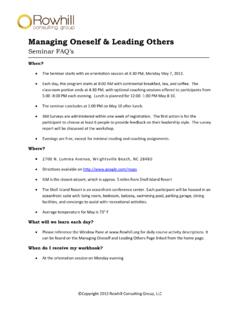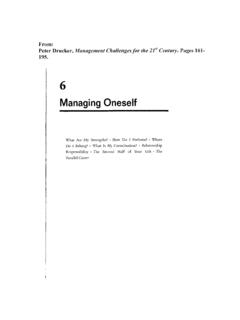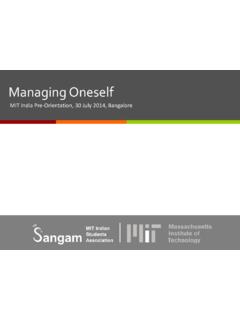Transcription of Managing Oneself - meghan-smith.com
1 Managing YOURSELF1999 BEST OF HBRWe live in an age of unprecedented opportunity: If you've got ambition andsmarts, you can rise to the top of your chosen profession, regardless of whereyou started with opportunity comes responsibility. Companies today aren't manag-ing their employees'careers; knowledge workers must, effectively, be theirown chief executive officers. It's up to you to carve out your place, to knowwhen to change course, and to keep yourself engaged and productive duringa work life that may span some 50 do those things well, you'll needto cultivate adeepunderstandingof yourself-not only what your strengthsand weaknesses are but also how you learn, how you work with others, whatyour values are, and where you can make the greatest contribution.
2 Becauseonly when you operate from strengths can you achieve true Oneselfby Peter R DruckerSuccess in theknowledge economycomes to those whoknow themselves-their strengths, theirvalues, and how theybest : istory's great achievers - aNapoleon, a da Vinci, a Mozart - havealways managed themselves. That, inlarge measure, is what makes themgreat achievers. But they are rare excep-tions, so unusual both in their talentsand their accomplishments as to beconsidered outside the boundaries ofordinary human existence. Now, mostof us, even those of us with modest en-dowments, will have to leam to man-age ourselves. We will have to leam todevelop ourselves. We will have to placeourselves where we can make the great-est contribution.
3 And we will have tostay mentally alert and engaged duringa 50-year working life, which meansknowing how and when to change thework we Are My Strengths?Most people think they know what theyare good at. They are usually often, people know what they arenot good at - and even then more peo-ple are wrong than right. And yet, a per-son can perform only from cannot build performance on weak-nesses, let alone on something one can-not do at history, people had littleneed to know their strengths. A personwas born into a position and a line ofwork: The peasant's son would also bea peasant; the artisan's daughter, anartisan's wife; and so on. But now peoplehave choices. We need to know ourstrengths in order to know where BUSTNESS REVIEUi Managing YOURSELFThe only way to discover yourstrengths is through feedback you make a key decision ortake a key action, write down what youexpect will happen.
4 Nine or 12 monthslater, compare the actual results withyour expectations. I have been practic-ing this method for 15 to 20 years now,and every time I do it, 1 am feedback analysis showed me, forinstance-and to my great surprise-thatI have an intuitive understanding oftechnical people, whether they are en-gineers or accountants or market re-searchers. It also showed me that I don'treally resonate with analysis is by no meansnew. It was invented sometime in thefourteenth century by an otherwise to-tally obscure German theologian andpicked up quite independently, some150 years later, by John Calvin and Ig-natius of Loyola, each of whom incor-porated it into the practice of his fol-lowers.
5 In fact, the steadfast focus onperformance and results that this habitproduces explains why the institutionsthese two men founded, the Calvinistchurch and the Jesuit order, came todominate Europe within 30 consistently, this simplemethod will show you within a fairlyshort period of time, maybe two orthree years, where your strengths lie -and this is the most important thing toknow. The method will show you whatyou are doing or failing to do that de-prives you of the full benefits of yourstrengths. It will show you where youare not particularly competent. And fi-nally, it will show you where you haveno strengths and cannot implications for action followfrom feedback analysis.
6 First and fore-most, concentrate on your strengths. Putyourself where your strengths can pro-duce E Drucker is the Marie RankinClarke Professor of Social Science andManagement (Emeritus) at ClaremontGraduate University in Ctaremont, Cali-fornia. This article is an excerpt from hisbook Management Challenges for the21st Century (HarperCollins, 1999)-Second, work on improving yourstrengths. Analysis will rapidly showwhere you need to improve skills or ac-quire new ones. It will also show the gapsin your knowledge -and those can usu-ally be filled. Mathematicians are bom,but everyone can learn , discover where your intellec-tual arrogance is causing disabling ig-norance and overcome it.
7 Far too manypeople - especially people with greatmanners. Manners are the lubricatingoil of an organization. It is a law of na-ture that two moving bodies in contactwith each other create friction. This is astrue for human beings as it is for inani-mate objects. Manners- simple thingslike saying "please" and "thank you"and knowing a person's name or askingafter her family-enable two people towork together whether they like eachother or not. Bright people, especiallyIt takes far more energy to improve fromincompetence to mediocrity than to improvefrom first-rate performance to in one area-are contemptu-ous of knowledge in other areas or be-lieve that heing bright is a substitutefor knowledge.
8 First-rate engineers, forinstance, tend to take pride in not know-ing anything about people. Human be-ings, they believe, are much too disor-derly for the good engineering resources professionals, by con-trast, often pride themselves on their ig-norance of elementary accounting or ofquantitative methods altogether. Buttaking pride in such ignorance is self-defeating. Go to work on acquiring theskills and knowledge you need to fullyrealize your is equally essential to remedy yourbad habits-the things you do or fail todo that inhibit your effectiveness andperformance. Such habits will quicklyshow up in the feedback. For example,a planner may find that his beautifulplans fail because he does not followthrough on them.
9 Like so many brilliantpeople, he believes that ideas movemountains. But bulldozers move moun-tains; ideas show where the bulldozersshould go to work. This planner willhave to learn that the work does not stopwhen the plan is completed. He mustfind people to carry out the plan and ex-plain it to them. He must adapt andchange it as he puts it into action. And fi-nally, he must decide when to stop push-ing the the same time, feedback will alsoreveal when the problem is a lack ofbright young people, often do not un-derstand this. If analysis shows thatsomeone's brilliant work fails again andagain as soon as cooperation fromothers is required, it probably indicatesa lack of courtesy - that is, a lack your expectations withyour results also indicates what not todo.
10 We all have a vast number of areasin which we have no talent or skill andlittle chance of becoming even medio-cre. In those areas a person - and espe-cially a knowledge worker-should nottake on work, jobs, and should waste as little effort as pos-sible on improving areas of low compe-tence. It takes far more energy andwork to improve from incompetence tomediocrity than it takes to improvefrom first-rate performance to excel-lence. And yet most people-especiallymost teachers and most organizations-concentrate on making incompetentperformers into mediocre ones. Energy,resources, and time should go insteadto making a competent person into astar Do I Perform?Amazingly few people know how theyget things done.

